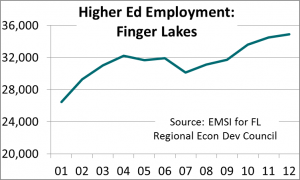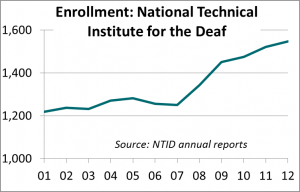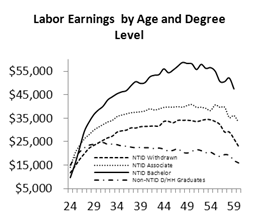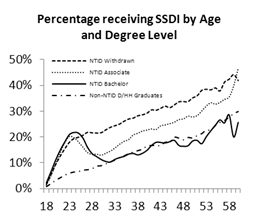
 Higher education is a major contributor to our region’s prosperity. Home to 18 colleges and universities, total employment in the sector rose steadily during the recession and totaled nearly 35,000 last year, up 16% since 2007.
Higher education is a major contributor to our region’s prosperity. Home to 18 colleges and universities, total employment in the sector rose steadily during the recession and totaled nearly 35,000 last year, up 16% since 2007.
Yet Rochester higher ed stands out for more than just job and payroll totals. The community is home to a number of distinctive institutions that set the region apart. One of these, the National Technical Institute for the Deaf (NTID) at the Rochester Institute for Technology, may be better recognized outside Rochester than inside.  NTID is the world’s first and largest technological college for students who are deaf or hard of hearing. Established by Congress in 1965, the first students entered in 1968.
NTID is the world’s first and largest technological college for students who are deaf or hard of hearing. Established by Congress in 1965, the first students entered in 1968.
A recent CGR study of NTID concluded that the Institute is responsible for more than 1,000 jobs, both direct and spillover, and over $50 million in labor income. Moreover, due to its national scope and reputation, it captured $84 million in outside funding (75% federal) over the 2006-11 period. NTID has done its part to strengthen higher ed in Rochester, boosting enrollment by 24% from 2007.
Those impacts are important, to be sure. What I found remarkable, however, was NTID’s commitment to the lifetime success of its graduates. Yes, every academic institution says the same thing. NTID actually measures it. While most post-secondary institutions expend some effort to maintain ties with their alumni and monitor their achievements, the National Technical Institute for the Deaf, through an ongoing contractual arrangement with the Social Security Administration (SSA), maintains a record of alumni earnings over time. No, the Social Security Administration doesn’t divulge actual salaries. SSA staff members do the analysis using Internal Revenue Service records and send the aggregated results to NTID.
This is far better information than most colleges and universities gather and report. Most institutions rely on alumni surveys. I think that it is reasonable to assume that the response rate to these surveys is better among successful alums, which lends them an upward bias. And the data are self-reported. Might some respondents inflate their reporting? By contrast, NTID’s results, based on federal records, are rock solid.
What is also unique is that the NTID/SSA study compares the careers of alumni to a comparison group: individuals with a hearing loss who graduated from other universities. This allows the institution to estimate the impact an NTID education had on its students’ employment and earnings profiles.
 The NTID study found that, on average, 78% and 73% of NTID bachelor’s and associate’s degree grads were employed at age 50. About 69% of the control group was employed. The earnings difference is more dramatic: NTID bachelor’s and associate’s grads earned $58,000 and $41,000 respectively, while graduates from other universities with a hearing loss had earnings of $21,000 (all adjusted to 2011 dollars). The study includes about 2,800 NTID students who have reached the age of 50, including 369 bachelor’s grads. The comparison group includes 1,178 individuals with a hearing impairment who graduated from another college or university.
The NTID study found that, on average, 78% and 73% of NTID bachelor’s and associate’s degree grads were employed at age 50. About 69% of the control group was employed. The earnings difference is more dramatic: NTID bachelor’s and associate’s grads earned $58,000 and $41,000 respectively, while graduates from other universities with a hearing loss had earnings of $21,000 (all adjusted to 2011 dollars). The study includes about 2,800 NTID students who have reached the age of 50, including 369 bachelor’s grads. The comparison group includes 1,178 individuals with a hearing impairment who graduated from another college or university.
A caveat is in order: The study has no way of controlling for pre-college “entry” qualifications. Some of the students in the control group may not have been accepted for admission by NTID. The unambiguous finding is that an NTID degree clearly supports career success for its alumni and strongly implies that NTID is doing a better job preparing its grads for career success than other post-secondary institutions.
 The earnings differential has policy implications. Individuals with hearing difficulties who are college educated draw less on social security than their counterparts lacking a college education. NTID’s study found their college graduates receive Social Security Disability Income (SSDI) at lower rates than those in the control group at most ages.
The earnings differential has policy implications. Individuals with hearing difficulties who are college educated draw less on social security than their counterparts lacking a college education. NTID’s study found their college graduates receive Social Security Disability Income (SSDI) at lower rates than those in the control group at most ages.
As NTID receives public sector support, this analysis also makes it possible to estimate the “return on investment” received by the public sector, as NTID grads can be shown to be less dependent on public assistance than individuals who graduated from other universities.
As a distinctive part of the Rochester higher education community, the National Technical Institute for the Deaf makes a big contribution to the local economy and promotes Rochester’s “brand” worldwide. More significantly, an Institute degree improves the employability and boosts lifetime earnings for its graduates.